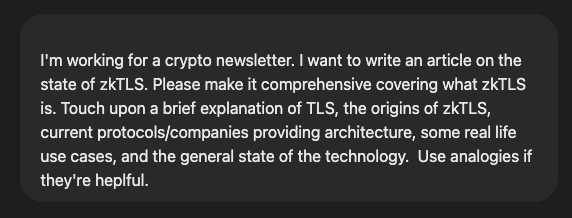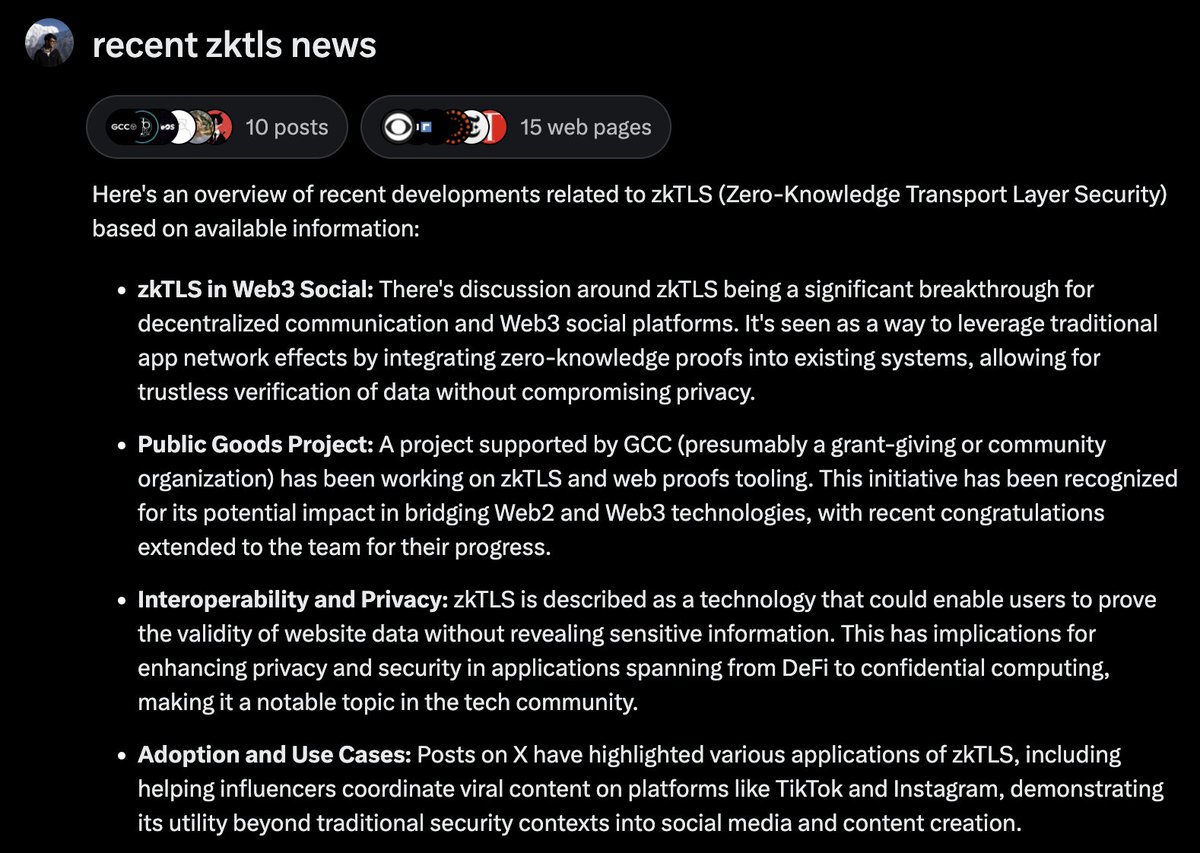
I've spent the past ten months writing long form technical research content for a living. The launch of ChatGPT's Deep Research naturally caught my attention. I spent yesterday exploring the model with two questions in mind: how much of my job can it already handle, and how can my firm Decentralised.co best position itself to leverage this tool?
Here are my initial thoughts.
Should I start looking for a new career?
Deep Research is impressive. Very impressive.
I asked the model to write a detailed article on zkTLS (conversation transcript). I chose this topic deliberately— it is something I've researched and written about before. But also because zkTLS is still a nascent technology where some major developments occurred in the past week. We’ll get to that in a bit.

First things first, the model is really very good. It took nine minutes to produce a 7,000 word (!) report—most of it made accurate and cohesive (probably 80% there). For comparison, writing something similar would typically take me at least 20 hours of research and writing. When I factor in my hourly rate, Sam Altman's claim about "50 cents of compute for 500 dollars of value" becomes surprisingly credible.

I hate how ugly the Grok icon makes tweet screenshots
Deep Research works by identifying a diverse range of high quality sources of information from the internet, processing it using the advanced reasoning model o3, finding patterns and commonalities, and structuring it all into a logical and coherent whole. Much of this is exactly what a human researcher does!
Because it is a robot with access to (almost) all of the internet, it has one distinct advantage over humans: breadth of content. For example, having written my own report on zkTLS, I assumed that I had read almost everything worth reading about on the topic. But looking at the report’s citations, I realised that there were some resources I simply hadn’t come across in my own research! Naturally, this also meant there were some topics and nuggets of information I didn’t know about.
But researching and synthesising is only half of what we do at Decentralised.co. The other half is making our research palatable and interesting for someone not technical or new to the topic. We do this through carefully chosen analogies from history and other sectors, complemented by custom visuals that break down difficult concepts. This human touch - the creativity in our explanations - sets us apart from other research outlets.

The kind of hand-drawn visuals we put out
Deep Research, at least for now, does not compete with humans in this aspect of my job. While its reports are thorough and well-researched, they’re still robotic. As a researcher familiar with zero-knowledge proofs and actively seeking information on zkTLS, I found its output exactly what I needed.
But would someone new to the field ever seek out this topic, let alone find the writing compelling? I’m not so sure about that. Even when I asked it to make the report more beginner-friendly (as you can see in the chat transcript), the result, though decent, didn't create that "wow, this is brilliant" moment we aim for.
When I think about the writing process for my own report on zkTLS, the first draft I produced was quite uninspiring, somewhat similar to the Deep Research report. Only after having conversations with others in the team, reading a couple of books, and completely rethinking how to present my articles did I craft something engaging. That whole process required a level of creativity—connecting disparate ideas and presenting them in an interesting way—that I don’t think current models process.
So am I worried about Deep Research replacing me? Quite the opposite. By handling the groundwork and surfacing resources I might have missed, it frees me to focus on what matters—reading more, crafting better narratives, and spending more time on art. The result? Higher quality work, delivered faster.
The Sources
The information sources Deep Research does (and doesn’t) use is also worth discussing. A bulk of the report is drawn from two main sources: Telah VC’s brilliant deep dive on zkTLS and Reclaim Protocol’s comprehensive blog posts. Anyone who reads these would grasp zkTLS quite thoroughly, so it's reassuring to see Deep Research building its analysis on these foundations.
My own report, which is not as technical but covers the business aspects of zkTLS, was not included among the 20+ resources the model used. As a writer, I find this disappointing because if people are using ChatGPT to learn about topics like zkTLS (as many in the future will), I want them to discover my fresh perspectives.
The reason for this omission became clear with a quick Google search for "what is zkTLS". ChatGPT seemingly pulls from top search results, including both the Telah and Reclaim blogs. This makes perfect sense—building a search engine from scratch is monumentally complex. Rather than tackling this challenge, ChatGPT likely leverages existing search engines for initial results, then applies its own filtering to select worthy information.
The implication here is that if you want AI-discovery, your best bet, at least for now, remains unchanged: create volumes of quality content and optimise for traditional SEO. High volume and SEO optimisation drive discovery, while quality determines AI selection.
Our newsletter missed the cut simply because we haven't optimised for SEO. We don't appear in Google or Bing searches for zkTLS. ChatGPT likely never even saw our content while crafting its report!
Recency
I mentioned earlier that zkTLS is a nascent and rapidly evolving technology. Just last week, an app using zkTLS technology by @OpacityNetwork shot up the iOS App Store charts. This is massive – it's the first real-world validation for a technology that's still finding its feet. Any current report on zkTLS should absolutely cover this milestone.
Yet Deep Research's report doesn't mention it. Given what we know about the model's information sources, this makes sense—the news hasn't yet filtered through to top search engine results. However, search "zkTLS" on X and you'll find this App Store development dominating recent discussions. If ChatGPT had access to X's data, this would've featured prominently in its analysis.
X has become the primary news source for technology. Founders increasingly bypass traditional media to share updates directly on the platform. Even Joe Biden chose X, not a press conference, to announce he was stepping down from the race.
While human researchers can easily search X for current developments, AI systems face a massive barrier. The platform's Pro API, at $5,000 monthly, doesn't even include access to top search results. That requires an enterprise account—something you can only get through X's sales team.
This pricing strategy makes perfect business sense, especially given how crucial real-time information has become for AI systems. It also hands xAI's Grok models an enormous data advantage over rivals. I expect we'll see xAI release increasingly sophisticated models, including reasoning tools similar to Deep Research. These will likely outperform competitors, at least in terms of information relevance.

Interestingly though, when I searched for recent zkTLS news on Grok, it missed the App Store development. Clearly, the xAI team still has work to do!
Who should be worried
While Deep Research doesn’t yet threaten my profession, other major sectors should brace for disruption.
Management consulting firms top this list. The reports Deep Research churns out mirror exactly what consultants get paid to deliver. As foundation models improve, they'll process more data, tap into wider internet sources, and offer smarter, more objective analysis – all faster and vastly cheaper!
Once OpenAI opens up Deep Research for enterprise customers and gains access to company data, these reports will become even more valuable. The only task left for consultants might be packaging this analysis into sleek PowerPoint presentations—though I suspect AI will soon handle that bit too.
I know several people in management consulting, and they're already struggling post-COVID. Clients have shifted from wanting recommendations to demanding results, often tying payment to outcomes. This has upended their decades-old business model and triggered massive internal turnover. Tools like Deep Research will only accelerate this transformation.
Beyond consulting, research firms churning out undifferentiated content should worry too. Unlike what we do at Decentralised—providing opinionated insights and creative outputs—many shops simply repackage existing information. While change won't happen overnight, readers will eventually just ask ChatGPT for whatever they want to learn, rather than paying for research subscriptions. Unless you're offering something truly unique, you're in trouble. Those with established distribution channels have the best shot at pivoting successfully.
The Human Touch
Finally, let's discuss the human touch. Yes, it's an overused phrase, but it's becoming more relevant as AI models grow more sophisticated.
AI models never write in first person unless specifically prompted. And why would they? They're statistical models trained on internet text, not beings with personal opinions.
I believe what truly engages readers is authentic, fresh insights from real humans. If you've read this far, you're likely interested in my personal take on Deep Research and how it connects to my experiences and observations over the years. You probably wouldn't have sought out this content if it hadn't appeared on your X feed. Even if you did, would ChatGPT have been able to produce a deeply personal product review like this one? I don't think so.
As AI becomes more advanced and skilled at writing, what will remain uniquely human (at least for now) is our desire to learn from and relate to others' personal experiences. As I mentioned earlier, what excites me is how AI might handle the routine aspects of writing, creating space for deeper thinking, feeling, experiencing, and craftsmanship. Amid an ocean of content, we might actually see more truly exceptional work emerge.
I also believe that on the current trajectory, curation and “taste” become important. Surfacing human gems from the sea of slop will become something humans start valuing and maybe paying for. If our existing social media feeds don’t adapt to this shift, new tools and platforms will emerge. You can expect many such human-first AI businesses in the future,
Go use it!
Deep Research is brilliant. If you can afford the $200 monthly subscription, or convince some friends to share an account, don't hesitate. There are two compelling reasons take the plunge. First, it's an incredible educational tool—ask for a report on any topic and Deep Research delivers a version that's 80% complete. More importantly, it gives you a glimpse into the future (which is already here, just evenly distributed) and helps you prepare for it.
I couldn’t be more excited for the future.